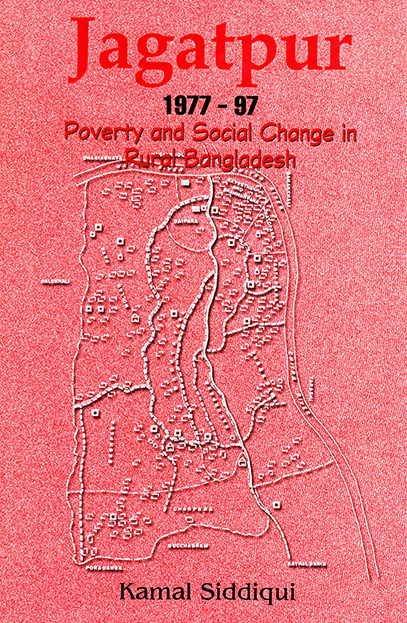- Shop
- Jagatpur 1977-97: Poverty and Social Change in Rural Bangladesh
Jagatpur 1977-97: Poverty and Social Change in Rural Bangladesh
https://uplbooks.com/shop/9789840515141-jagatpur-1977-97-poverty-and-social-change-in-rural-bangladesh-3026 https://uplbooks.com/web/image/product.template/3026/image_1920?unique=90f5a49
| Language: English |
Tags :
Book Info
This is a longitudinal study seeking to explain poverty in rural Bangladesh during the two decades between 1977 and 1997. More explicitly, the objective has been to delineate the processes within rural society which caused, aggravated, maintained and reduced poverty in a typical Bangladesh village during the period. On both occasions, long drawn and painstaking fieldwork was undertaken within a holistic framework of analysis. Development of the physical infrastructure by the government, the provision of microcredit by the NGOs and the supply and dissemination of modem agricultural inputs by the private sector are, by themselves quite inadequate to address the problems of rural poverty in Bangladesh. There is a strong need to reform the anti-poor economic processes relating to production and exchange, and at the same time, the poor and the women must occupy their rightful place in all organisations and institutions relevant to them. The critical missing link in this regard is the ideological intervention required to break the present impasse created by the emergence and stranglehold of the "cocktail ideology" discussed in the book. A strategy combining (a) a qualitative improvement of secular education, aiming at a higher level of knowledge and skills and humanist values; and (b) wide dissemination of an indigenous version of liberation theology, seems to be eminently suitable "entry points" to deal with this situation. All economic and social development programmes, even within a reformist perspective, need to be dovetailed to this basic strategy in order to have the desired effect of rapid poverty alleviation. Given its extraordinary methodological rigour and penetrating analysis of the causes of poverty, this book will be difficult to be ignored by both academics and practitioners in this field.

Kamal Siddiqui
Kamal Siddiqui is a leading authority on local government in South Asia. Educated in the Universities of Dhaka, Leeds and London, he combines in him solid academic work with the practical experience of a civil servant, working at both grassroots as well as highest levels of policy-making and monitoring policy implementation. His important publications in the field include Megacity Governance in South Asia: A Comparative Study (Dhaka: UPL, 2004), Overcoming the Governance Crisis in Dhaka City (Dhaka: UPL, 2000), Local Governance in Bangladesh: Leading Issues and Major Challenges (Dhaka: UPL, 2000) and Local Government in South Asia: A Comparative Study (Dhaka: UPL, 1992; a Chinese translation of the book was brought out by the Ministry of Civil Affairs of China

কামাল সিদ্দিকী
Kamal Siddiqui is a leading authority on local government in South Asia. Educated in the Universities of Dhaka, Leeds and London, he combines in him solid academic work with the practical experience of a civil servant, working at both grassroots as well as highest levels of policy-making and monitoring policy implementation. His important publications in the field include Megacity Governance in South Asia: A Comparative Study (Dhaka: UPL, 2004), Overcoming the Governance Crisis in Dhaka City (Dhaka: UPL, 2000), Local Governance in Bangladesh: Leading Issues and Major Challenges (Dhaka: UPL, 2000) and Local Government in South Asia: A Comparative Study (Dhaka: UPL, 1992; a Chinese translation of the book was brought out by the Ministry of Civil Affairs of China



